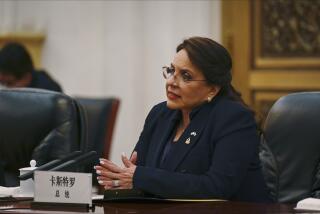America’s Dirty Hands in Honduras
- Share via
In the early 1980s, the Reagan Administration turned Honduras into a U.S. military satellite. Millions of dollars were spent on the Honduran military forces in an effort to build up a base from which to counter the guerrillas in El Salvador and support the Contras battling Nicaragua’s Sandinista government.
As part of the deal, the CIA financed and trained Battalion 316 of the Honduran army. The rationale in creating the battalion was to interdict weapons shipments to guerrillas. Unfortunately, as we are learning now, Battalion 316 may also have been responsible for the disappearance or deaths of at least 140 people.
In a recent Baltimore Sun series on the extent of U.S. support for Battalion 316, the picture that emerges is terrifying. No only did American forces train the battalion in surveillance and interrogation tactics here in the United States but, starting in 1981, Washington provided the funds to hire Argentine counterinsurgency experts--the same men responsible for the deaths or disappearance of more than 10,000 Argentine citizens during that country’s infamous “dirty war”--to teach the Hondurans what the press reports called “methods to eliminate subversives.”
The whole affair is now being ventilated in a Honduran court only because six Honduran citizens who survived a massacre perpetrated by Battalion 316 have pressed charges of attempted murder and illegal detention against 10 Honduran military officers.
What the victims want is fair. They want those responsible for the atrocities to be tried and, if convicted, punished. The case, presented in July to a judge, is still awaiting resolution.
In the meantime, Leo Valladares, a brave man who is Honduras’ human-rights ombudsman, is asking for the declassification of U.S. documents regarding human-rights abuses and disappearances in the 1980s.
Valladares’ request deserves support. After all, Washington is responsible in part for this nightmare and it ought to shed some light on one of the darkest pages of U.S. involvement in Latin America.
The former commander of Battalion 316 is now the chief of the Honduran armed forces and he refuses to allow civilian jurisdiction over the military. Church hierarchies, both Catholic and Protestant, have asked the relatives of the victims to forgive and forget, and Honduran President Roberto Reina wants to solve the issue with a cash settlement for the relatives of the victims.
We say no. A thorough investigation is warranted. The nation should want to distance itself from ruthless military commanders.
More to Read
Sign up for Essential California
The most important California stories and recommendations in your inbox every morning.
You may occasionally receive promotional content from the Los Angeles Times.













